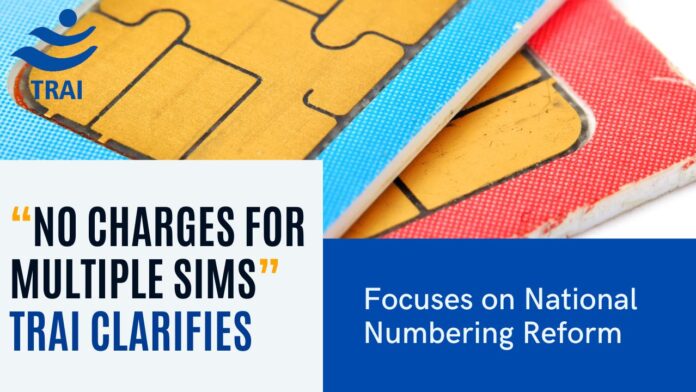On June 6, the Telecom Regulatory Authority of India (TRAI) released a consultation paper titled “Revision of National Numbering,” inviting feedback on various aspects related to telecom identifiers (TIs) and potential charges. The paper quickly stirred controversy amidst media reports suggesting TRAI’s consideration of levying charges on mobile numbers, triggering public concern and criticism.
The consultation paper queried stakeholders on whether charges should be introduced for existing and newly allocated TI resources to ensure efficient utilization. It also sought inputs on the mechanism and justification for such charges, as allowed under the Telecommunications Act, 2023.
In response to the growing backlash and misconceptions, TRAI issued a clarification on June 14, vehemently denying intentions to impose charges on customers holding multiple SIM cards or numbering resources. The regulator clarified that the consultation aimed to assess factors impacting TI allocation and utilization, with proposals to refine policies and procedures to meet current and future needs adequately.
Highlighting its stance on minimal regulatory intervention, TRAI emphasized promoting forbearance and market-driven self-regulation. It condemned misleading claims circulating about the paper and reaffirmed its commitment to transparent consultation processes.
The paper also addressed potential financial disincentives for telecom operators retaining a significant percentage of allocated TIs unused over a specified period. Additionally, it sought feedback on anticipated TI shortages for fixed-line services and proposed revisions to allocation criteria.
A notable aspect of the consultation was TRAI’s exploration of transitioning towards a 13-digit mobile numbering system for SIM-based machine-to-machine (M2M) communication. This move aligns with previous recommendations to accommodate growing M2M connections, crucial for emerging technologies like the Internet of Things (IoT).
TRAI highlighted that the current 13-digit numbering series for M2M devices includes specific identifier codes allocated by the Department of Telecommunications (DoT). These codes facilitate the generation of up to 10 billion mobile numbers, supporting future scalability in M2M services.
Moreover, the paper suggested considerations for defining ‘inactive connections’ in mobile services and proposed timelines for reusing inactive TIs. It also raised the prospect of imposing nominal charges on telcos for TI allocations, citing numbering resources as public assets owned by the government.
This development comes amidst TRAI’s intensified efforts to enhance telecom services, including proposed regulations for 5G service quality, oversight frameworks for OTT communication services, and initiatives to enhance consumer transparency through coverage maps.
The consultation period for stakeholders to submit feedback on the “Revision of National Numbering” paper is underway, reflecting TRAI’s commitment to fostering inclusive and informed decision-making in India’s telecom sector.




